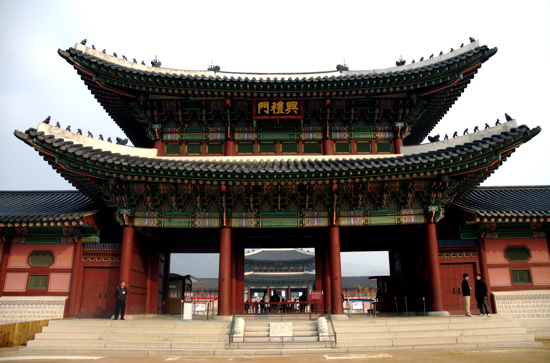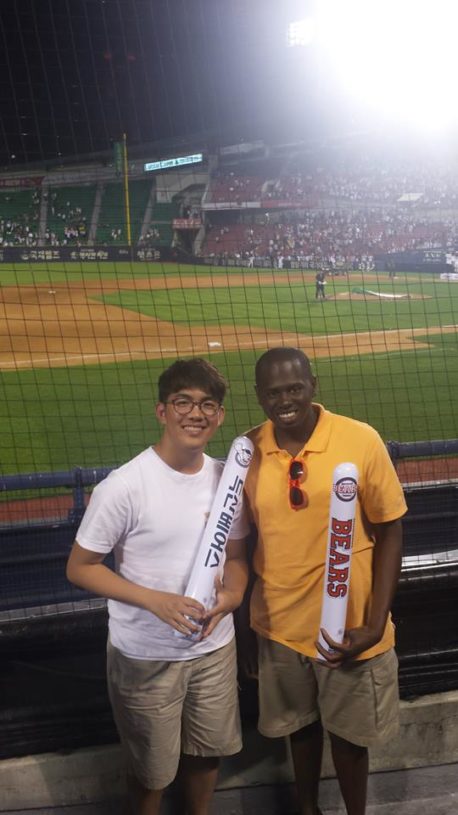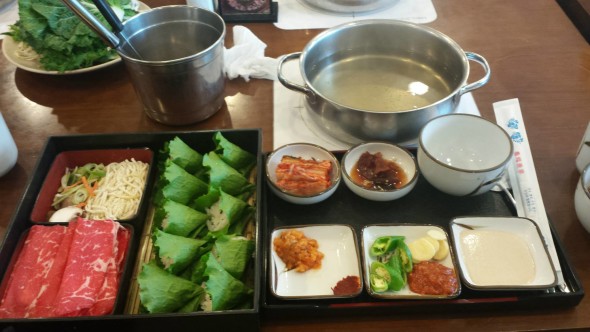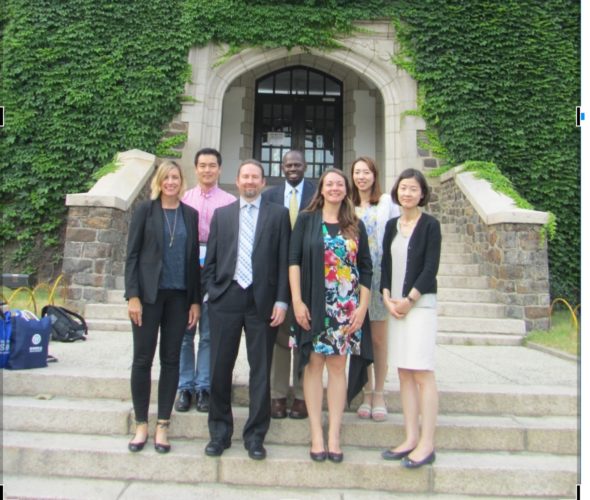After spending eight days in Seoul, South Korea as part of Washington University’s Global Diversity Overseas Seminar (GDOS) program, I not only have a better appreciation for South Korean culture, but have also gained a closer relationship with five other WUSTL staff members who traveled with me. Months of reading about Korea and discussing Korean culture did not compare to the immersive experience in Seoul that has helped me broaden my lens of diversity and look more closely at cross-cultural communication barriers.
Guest blogger: Christopher Presley, BSBA Academic & Student Services Advisor; read related post about the GDOS program
My trip to Seoul was filled with many sight-seeing adventures, in addition to visiting Seoul National University and Yonsei University, the top two institutions in the country. Visiting the Gyeongbokgung Palace, Gwangjang Food Market, the Bongeunsa Buddhist Temple were all sights that took my breath away.
 Flawless architecture from the Joseon Dynasty continued to blow my mind, especially to think of how many of the buildings were built before modern technology and engineering methods, especially relating to heating and cooling systems while also maximizing natural light for the buildings.
Flawless architecture from the Joseon Dynasty continued to blow my mind, especially to think of how many of the buildings were built before modern technology and engineering methods, especially relating to heating and cooling systems while also maximizing natural light for the buildings.
 The trip even included cheering on the Doosan Bears vs LG Twins with Olin BSBA sophomore Jin Hwan (Josh) An. Josh was such a great guide to our experience and helped us learn more about the city and Korean culture.
The trip even included cheering on the Doosan Bears vs LG Twins with Olin BSBA sophomore Jin Hwan (Josh) An. Josh was such a great guide to our experience and helped us learn more about the city and Korean culture.
The highlight of my trip was visiting Seoul National University, Yonsei University, and the Fulbright Education USA Advising Center. Understanding the K-12 education system, the Suneung (Korean college entrance exam), and opportunities at both Yonsei and Seoul National have helped me frame my conversations and approach with the students I advise on a daily basis at Olin.
The conversation became even more interesting after learning that Olin’s very own Dean Mahendra Gupta and Jongryn Mo, Yonsei vice president for international affairs and professor of international political economy, completed their PhDs at Stanford together.
While there is no formal Olin exchange program with Seoul National University at this time, I’d love to see this come to fruition, as the partnership could be mutually beneficial for each student population. Since the partnership with Olin and Yonsei University began after the Korean War, it was even more helpful to understand how America influenced South Korea in all aspects, which included business education. [Olin and Yonsei University launched a joint Global Masters of Finance program this year.]
 Of course the food was an adventure within itself. While I did not expect to eat much beef and pork, the trip provided many opportunities to shock my taste buds! After getting adjusted to the communal dining with shared side dishes and eating with chopsticks every meal, I was able to dive right into the flavor of the pork belly, myeolchi bokkeum (anchovies), kimchi soup, dumplings, octopus and squid. I even had the opportunity to share Korean BBQ with Elise Hu, National Public Radio broadcast journalist and St. Louis native. As advised by friends who’ve traveled to Seoul, street food consisting of waffle ice cream sandwiches and grilled chicken skewers are the best snacks in between meals!
Of course the food was an adventure within itself. While I did not expect to eat much beef and pork, the trip provided many opportunities to shock my taste buds! After getting adjusted to the communal dining with shared side dishes and eating with chopsticks every meal, I was able to dive right into the flavor of the pork belly, myeolchi bokkeum (anchovies), kimchi soup, dumplings, octopus and squid. I even had the opportunity to share Korean BBQ with Elise Hu, National Public Radio broadcast journalist and St. Louis native. As advised by friends who’ve traveled to Seoul, street food consisting of waffle ice cream sandwiches and grilled chicken skewers are the best snacks in between meals!
Like St. Louis, Seoul has different areas of the city, which can sometimes show a socioeconomic divide among the citizens. Our group was able to stay in Myeongdong at Savoy Hotel, one of Seoul’s most popular shopping and cosmetic areas, which provided many opportunities for shopping and sightseeing. In addition, we visited Insadong, Itaewon, Gangnam, and Jamsil areas of the city, all comfortable rides via the metro system. Each part of the city helped me understand more about the Korean culture to compare and contrast with American culture. These experiences gave me much insight to the culture shock and transitions a student from Seoul may experience at WashU, St. Louis, and in the United States.
For me, Seoul was a wonderful introduction to Asian and Korean culture. After this trip, I’ve been mentally planning my next excursion. If I could share three things I’ve learned from my trip that are myths about Seoul: wifi is not as abundant in the city as you might think, not everyone will speak English (especially not taxi drivers), and pedestrian-only areas are rare in the city.
To fellow staff members: as you begin to consider professional development opportunities while at WUSTL, I encourage you to apply for the GDOS program if you have very hands-on interactions with students on campus! I will forever be grateful to the Provost’s Office for providing this opportunity for both personal and professional growth.



